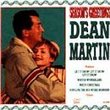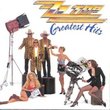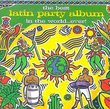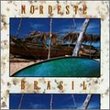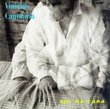| All Artists: Ruggero Leoncavallo, Concertgebouw Orchestra Amsterdam, Riccardo Chailly, José Cura, Barbara Frittoli, Carlos Alvarez, Simon Keenlyside, Netherlands Radio Choir Title: Leoncavallo - Pagliacci / Cura, Frittoli, Álvarez, Keenlyside, Concertgebouw, Chailly Members Wishing: 0 Total Copies: 1 Label: Decca Release Date: 10/10/2000 Genres: Jazz, Classical Style: Opera & Classical Vocal Number of Discs: 1 SwapaCD Credits: 1 UPC: 028946708620 |
Search - Ruggero Leoncavallo, Concertgebouw Orchestra Amsterdam, Riccardo Chailly :: Leoncavallo - Pagliacci / Cura, Frittoli, Álvarez, Keenlyside, Concertgebouw, Chailly
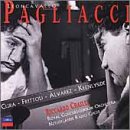 | Ruggero Leoncavallo, Concertgebouw Orchestra Amsterdam, Riccardo Chailly Leoncavallo - Pagliacci / Cura, Frittoli, Álvarez, Keenlyside, Concertgebouw, Chailly Genres: Jazz, Classical
Does the world need another Pagliacci? Well perhaps, if it amounts to something materially unlike the others on the market--and this new recording from Riccardo Chailly is just that. Where Karajan's classic DG version g... more » ![header=[] body=[This CD is available to be requested as disc only.]](/images/attributes/disc.png?v=a4e11020) ![header=[] body=[This CD is unavailable to be requested with the disc and back insert at this time.]](/images/attributes/greyed_disc_back.png?v=a4e11020) ![header=[] body=[This CD is unavailable to be requested with the disc and front insert at this time.]](/images/attributes/greyed_disc_front.png?v=a4e11020) ![header=[] body=[This CD is unavailable to be requested with the disc, front and back inserts at this time.]](/images/attributes/greyed_disc_front_back.png?v=a4e11020) |
Larger Image |
CD DetailsSynopsis
Amazon.com Does the world need another Pagliacci? Well perhaps, if it amounts to something materially unlike the others on the market--and this new recording from Riccardo Chailly is just that. Where Karajan's classic DG version goes for expansive grandeur and Muti's various Philips readings for rapid gloss, Chailly makes no particular stand on tempi and avoids glossy effects. Instead, he gives you a dark and grainy-textured piece of drama with voices to match, the tone set by Carlos Alvarez (Tonio) in a prologue that leaves no doubt about who'll be the villain of the piece. You also get a shadow in the voice of José Cura (Canio), who makes this disc a calling card for his credentials as a serious singer-actor and contains the bell-like potential of his singing in an earthy desperation--more cinéma vérité than conventional verismo. The sobs are there for "Vesti la giubba," but not in the dimensions that come with Pavarotti's hankie to attend them. You feel the private trauma of a man on the edge rather than the public histrionics of a performer playing to the gallery. Barbara Frittoli makes a slightly cool Nedda but registers in vocal coloring how differently she feels toward the three men in her operatic life. Among them, Simon Keenlyside cuts an ardent, eloquently virile figure as her lover Silvio. And the Concertgebouw almost counts as a lover too, with brilliantly articulated playing that compensates for a soft-edged chorus--and is seductive. A distinctive Pagliacci? Yes. --Michael White Similarly Requested CDs
|
CD ReviewsA fine modern recording of this opera Joy Fleisig | New York, NY United States | 07/31/2001 (4 out of 5 stars) "Although there are many great and historical important recordings of Leoncavallo's `Pagliacci' (my personal favorite is the EMI recording starring Jussi Bjorling), there are a considerable number of opera fans who will want a more recent release in digital sound. The pickings have been slim until now. The budget label Naxos released a recording that I haven't heard but is generally considered to be merely adequate, and then there is the truly dreadful Phillips recording under Riccardo Muti, poorly sung and mind-numbingly slow. Fortunately, this new recording, minor reservations aside, is well worth buying. Despite the big-name tenor and a fine supporting cast, the true star of this recording is Riccardo Chailly, who conducts with great sensitivity to the score and singers and elicits beautiful playing from the Royal Concertgebouw. Chailly paces the opera very well (10 minutes faster than Muti!) and he does striking things with dynamics. For example, the overture is light-hearted, almost sprightly, rather like the music for the commedia, and retains this fresh quality throughout Act I. The orchestra reaches sensuous heights in the Nedda/Silvio duet, and displays incredible sweetness and longing in the reprise of `Un nido di memorie' in the overture to Act II, where the music finally starts to take a turn for the menace which awaits the characters...Although Jose Cura impressed me a great deal with his first CD, I've been rather disappointed in much of what I've seen and heard from him lately. I believe he has made a major mistake in conducting his own CDs, and I also think he has been miscast in roles that are too lyric for him (e.g. Alfredo). So how does he do here, in a role which seems vocally and dramatically ideal for him under the baton of an excellent and singer-friendly conductor? Mostly very well. His voice is very reminiscent of Mario Del Monaco with its huge size, dark virility and blazing top, although without quite Del Monaco's rich middle, and his voice does occasionally sound dry and nasal in that range. He is a commanding vocal actor and he impresses greatly in the confrontations - especially the end of Act II beginning from 'Sperai'. But I don't think he does quite enough to differentiate Canio's 3 different arias, and I've heard him sing elsewhere with considerably more nuance and sensitivity. We really don't see Cura's Canio demonstrate much other emotion than rage, and far too many tenors do it that way. Admittedly, `Vesti la giubba' is powerfully and movingly sung, and the laughter and sobbing is a genuine emotional response as opposed to tenorial grandstanding (one awful gasp right before `Tu sei Pagliaccio' aside, where the emotion doesn't carry into the next phrase). I really think I need to see Cura do this role in the theatre in order to properly judge him (especially given his reputation as a stage animal). In the meantime, however, Cura still strikes me as a `promising' singer, and he needs to do a lot more work to fulfill his vast potential. Barbara Frittoli is not only the most impressive of the soloists vocally, but also the major source of the recording's drama. This is a far better showcase for her than the dreadful 'Bocelli Boheme', and Mimi isn't really her role even under better circumstances. With her dark, rich, tangy voice, warm lower register, and lovely top, it's easy to understand her growing reputation as a Mozartian and a Verdian. Her Nedda is appropriately dreamy and excited in the Ballatella (with a fine trill), thoroughly contempuous of and vicious to Tonio, genuinely torn over running away with Silvio before giving in to tenderness and ecstasy, and finally almost heroic in her defiance of Canio, giving up her life for the man she loves. I first heard Carlos Alvarez at his Met debut as Germont in 1996 and thought him rather dull. He might have been suffering from 'debut nerves', because he is far more impressive here. His voice is firm and rich, and he is excellent at projecting Tonio's menace and anger even if the tender moments (namely 'Un nido di memorie') don't come off as well and his top notes don't seem to be quite so easily produced as his strong bottom. Still, Alvarez is an excellent dramatic foil for both Cura and Frittoli. Simon Keenlyside's voice is a bit lighter than I'd like for Silvio (I'm used to Robert Merrill and Dwayne Croft), but he has plenty of warmth and ardour and his voice makes a nice contrast to Alvarez. Charles Castronuovo is a member of the Met's Young Artist's Development Program and has sung Beppe there. He has an attractive voice and if the Harlequin Aria misses the ideal honey sweetness, it is still sung with grace and feeling. Castronuovo is also excellent in all the 'dialogue' exchanges, particularly Beppe's trying to control Canio's temper. The two peasants are adequate.The chorus seems to be recorded from a bit too far away - they're a bit too polite to be excited Calabrian peasants, especially the boy's chorus of street urchins. Still, the `Bell Chorus' comes off beautifully, and they react well to the goings-on in the commedia.The booklet contains pictures of all the principals except for Castronuovo, but no biographical information. There is an essay on the work, a plot summary, and full text and translation. I actually found some of the Britishisms in the translation quite amusing.If you must have only one recording of `Pagliacci', I would suggest that you instead go for the versions with Gigli, Bjorling, Bergonzi, Corelli, Vickers, etc. in the title role. However, this is a good supplemental recording, especially if you insist on modern sound. If this recording ultimately doesn't reach the heights of some of the greatest 'Pagliacci's on record, it is still a fine showcase for some very good singers and one of the finest conductors of our day." Murderous clown sings well but recording lacks frisson Joy Fleisig | 10/19/2000 (4 out of 5 stars) "Leoncavallo's Pagliacci is verismo at its best, which for me implies that while it's not exactly pretty, it's incredibly hot-blooded and passionate, as it throbs relentlessly towards its bloody conclusion. This recording, while enjoyable to listen to, lacks the necessary frisson that one finds in Karajan's recording on DG with Carlo Bergonzi as Canio, the murderous clown. Cura's Canio is well sung throughout, but for me his performance lacks the profound and overwhelming pathos that make this opera so popular. This is especially true in what is one of all opera's most famous numbers, "vesti la giubba." Here it is well sung and pleasing to listen to, but it doesn't make the neck hairs stand on end! The chorus is also disappointingly subdued, especially near the opera's conclusion. This is a "civilized" recording of Pagliacci, if you will. My top choice is for a more hot-blooded recording brimming with an unending intensity of jealousy and rage, which is exactly what one gets with the Karajan recording on DG--a true classic!" IMPRESSIVE PAGLIACCI GEORGE RANNIE | DENVER, COLORADO United States | 10/14/2002 (5 out of 5 stars) "This recording of Pagliacci is very impressive and most enjoyable. I was very thrilled with Jose Cura when I heard his first recital disc of Puccini Arias; however, I've been somewhat disappointed in his subsequent recordings. This recording of Pagliacci certainly restores my hopes that Jose Cura is a leading tenor. I truly feel he makes a huge mistake by conducting his own recordings and by singing roles that require a lighter voice than he possess. This recording, to me, proves that point--top opera conductor and a dramatic role.I find Jose Cura's Pagliacci, in this recording, to be very well sung and very emotional. His Vesti la Giubba is gripping but not overdone--the laughs and sobs are rendered very movingly and tastefully. The rest of the cast is spendid! Carlos Alvarez has a true dramatic baritone voice that he uses very well. Barbara Fritolli is "new" to me; however, I was very impressed. She sings Nedda for all it's worth. I look forward to hearing more from her.In summation, Bravo to all especially to Riccardo Chailly for conducting this much abused opera so well."
|

 Track Listings (21) - Disc #1
Track Listings (21) - Disc #1